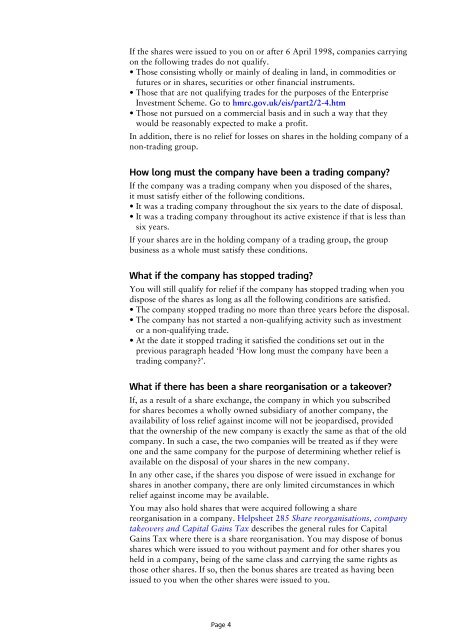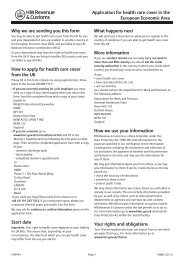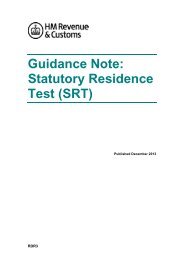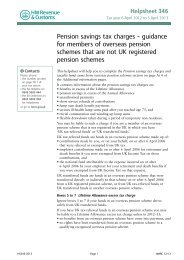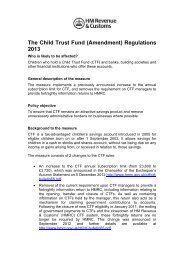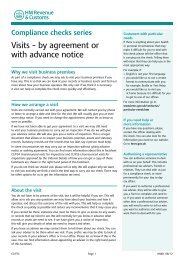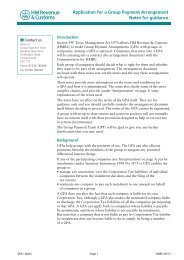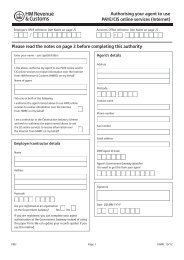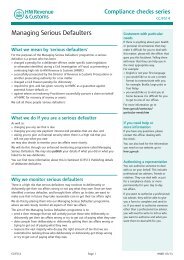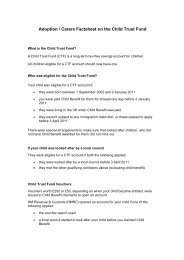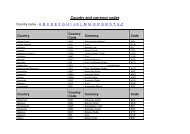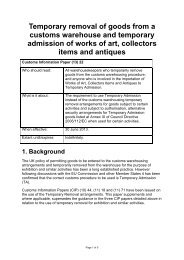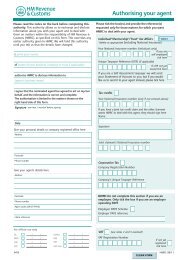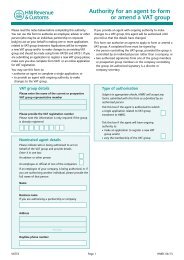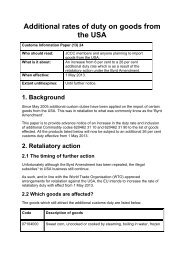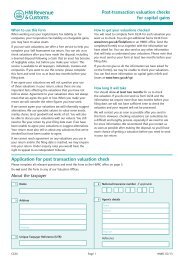Helpsheet 286
Helpsheet 286
Helpsheet 286
You also want an ePaper? Increase the reach of your titles
YUMPU automatically turns print PDFs into web optimized ePapers that Google loves.
If the shares were issued to you on or after 6 April 1998, companies carrying<br />
on the following trades do not qualify.<br />
• Those consisting wholly or mainly of dealing in land, in commodities or<br />
futures or in shares, securities or other financial instruments.<br />
• Those that are not qualifying trades for the purposes of the Enterprise<br />
Investment Scheme. Go to hmrc.gov.uk/eis/part2/2-4.htm<br />
• Those not pursued on a commercial basis and in such a way that they<br />
would be reasonably expected to make a profit.<br />
In addition, there is no relief for losses on shares in the holding company of a<br />
non-trading group.<br />
How long must the company have been a trading company?<br />
If the company was a trading company when you disposed of the shares,<br />
it must satisfy either of the following conditions.<br />
• It was a trading company throughout the six years to the date of disposal.<br />
• It was a trading company throughout its active existence if that is less than<br />
six years.<br />
If your shares are in the holding company of a trading group, the group<br />
business as a whole must satisfy these conditions.<br />
What if the company has stopped trading?<br />
You will still qualify for relief if the company has stopped trading when you<br />
dispose of the shares as long as all the following conditions are satisfied.<br />
• The company stopped trading no more than three years before the disposal.<br />
• The company has not started a non-qualifying activity such as investment<br />
or a non-qualifying trade.<br />
• At the date it stopped trading it satisfied the conditions set out in the<br />
previous paragraph headed ‘How long must the company have been a<br />
trading company?’.<br />
What if there has been a share reorganisation or a takeover?<br />
If, as a result of a share exchange, the company in which you subscribed<br />
for shares becomes a wholly owned subsidiary of another company, the<br />
availability of loss relief against income will not be jeopardised, provided<br />
that the ownership of the new company is exactly the same as that of the old<br />
company. In such a case, the two companies will be treated as if they were<br />
one and the same company for the purpose of determining whether relief is<br />
available on the disposal of your shares in the new company.<br />
In any other case, if the shares you dispose of were issued in exchange for<br />
shares in another company, there are only limited circumstances in which<br />
relief against income may be available.<br />
You may also hold shares that were acquired following a share<br />
reorganisation in a company. <strong>Helpsheet</strong> 285 Share reorganisations, company<br />
takeovers and Capital Gains Tax describes the general rules for Capital<br />
Gains Tax where there is a share reorganisation. You may dispose of bonus<br />
shares which were issued to you without payment and for other shares you<br />
held in a company, being of the same class and carrying the same rights as<br />
those other shares. If so, then the bonus shares are treated as having been<br />
issued to you when the other shares were issued to you.<br />
Page 4


